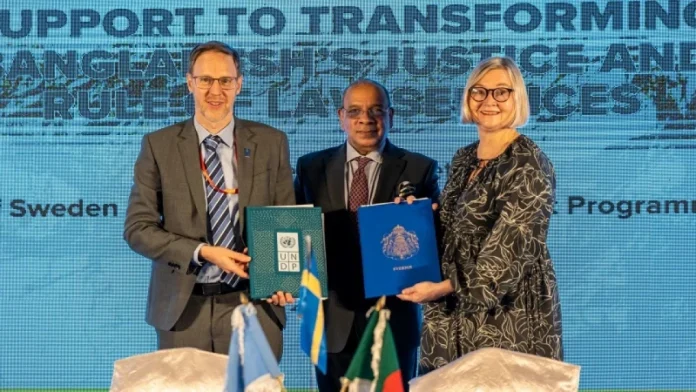The Embassy of Sweden in Bangladesh and the United Nations Development Programme (UNDP) signed an agreement on Sunday to continue their support for the ongoing reform of the justice system in the country.
The ongoing project was officially announced by the Charge d’Affaires of the Embassy of Sweden, Maria Stridsman, and the UNDP Resident Representative, Stefan Liler, at a signing ceremony in Dhaka today. Chief Justice of Bangladesh Dr. Syed Refaat Ahmed, as well as high-level officials from the Supreme Court and the Ministry of Law, Justice and Parliamentary Affairs, were also present.
Under the agreement, Sweden will provide a second tranche of 5 million Swedish kronor to the “Support to Transforming Bangladesh’s Rule of Law Services” project. Through this, a lot of work is being done to reform the justice system. This initiative is part of UNDP’s “Integrated Support for Advancing Reforms and Democratic Governance” program.
The new phase will build on the project’s previous progress by focusing on ensuring judicial independence, prosecution reform and access to justice – especially for women, youth and marginalized groups. The Supreme Court’s new hotline service for litigants will be further enhanced and other support will be increased, including the transformation of the Attorney General’s Office into a professional prosecution service.
Speaking at the event, Maria Stridsman said, “Sweden reiterates its strong commitment to supporting Bangladesh in its efforts to strengthen democratic governance, human rights and the rule of law. Ensuring equal access to justice for all is a cornerstone of justice sector reform. Sweden is proud to be able to support a transparent, accountable and inclusive justice system through its long-standing partnership with UNDP, which serves and upholds the fundamental rights of all citizens.”
“Prioritizing judicial reform is not only a fundamental need for economic development, prosperity and stability in Bangladesh, but also a commitment to them in recognition of the unprecedented uprising of young people against injustice, arbitrariness and oppression in 2024. Through this, Bangladesh is paving the way for a democratic, inclusive and prosperous future.”
He added, “UNDP will support the government and the judiciary in creating the legal and institutional environment and necessary safeguards to achieve independence of judicial processes at all levels of the judiciary, including lower courts. We are also committed to developing rules and regulations for the judiciary’s own administration, ensuring that judges are well informed about their effective independence.”
The project will work on strengthening digitalization in the judiciary to create better access to justice for all. It will also align Bangladesh’s judicial reforms with international standards and norms and conduct extensive advocacy to build public awareness and trust in justice. Gender-sensitive reforms will be advanced through legal reviews and collaboration with women’s rights organizations. The initiative will encourage the active participation of citizens, youth, lawyers and the media, so that justice system reforms are responsive to the needs of the people. This Sweden-UNDP agreement will contribute to the achievement of Sustainable Development Goal (SDG) 16 – Peace, Justice and Strong Institutions.




